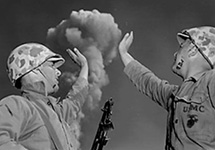August 29, 2019
Margaret Croy
The following is an excerpt of an article published on Inkstickmedia.

Nuclear test at Yucca Flats, Nevada.
Source: National Atomic Veterans of America (naav.com)
Nuclear testing is back in the news, and not in a good way. Between a Defense Intelligence Agency (DIA) statement on the possibility of low-yield nuclear weapons testing in the Russian Federation, the controversy over a beer named Bikini Atoll, and the failure of certain International Monitoring System (IMS) stations to transmit information to the Comprehensive Nuclear-Test-Ban Treaty Organization (CTBTO) after a presumed nuclear-powered cruise missile explosion off the coast of Russia, there is a lot linked to nuclear testing that has made its way into popular news. Unfortunately, the International Day against Nuclear Tests, August 29th, has not.
[…]Indeed, there has been a longstanding debate within the US legislative and policy community about the merits of nuclear testing, for a wide variety of reasons (not all linked to security). Before the harmful effects of radiation were fully known, the US and the USSR signed the Treaty Between The United States of America and The Union of Soviet Socialist Republics on Underground Nuclear Explosions for Peaceful Purposes (PNE Treaty), which was designed to protect the right to use nuclear detonations for peaceful purposes (like mining) in the two nations. Just days ago, President Trump inquired about the possibility of detonating a nuclear weapon in the eye of a hurricane to throw it off course. While both of these examples are comically absurd, many more are not. Robert R. Monroe, Retired Vice Admiral of the US Navy and former director of the Defense Nuclear Agency, is one of the strongest proponents of the concept that a resumption of nuclear testing is required for national security, and has written at length about these views in The Hill and The Washington Times. Former Senator Jon Kyl (R-AZ) authored a piece in the Wall Street Journal entitled, “Why We Need To Test Nuclear Weapons.” Then-Senator Kyl noted that in 2008, “Paul Robinson, chairman emeritus of Sandia National Laboratory, testified before Congress that the reliability of US nuclear weapons still cannot be guaranteed without testing them, despite more than a decade of investments in technological advancements.”
Continue reading at Inkstickmedia.
